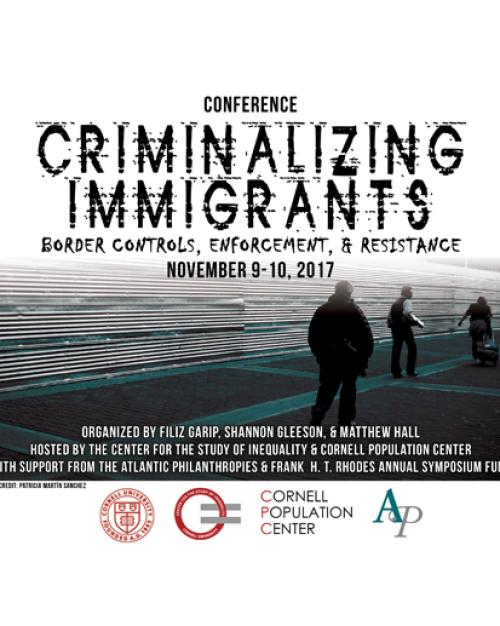Today, 245 million people live outside of the countries where they were born, many escaping economic conditions, political suppression, or wars. But despite their circumstances, many are unwelcome in their new countries.
The Center for the Study of Inequality is partnering with the Cornell Population Center to sponsor a conference Nov. 9-10, “Criminalizing Immigrants: Border Controls, Enforcement, and Resistance in Comparative Perspective.” The event will feature keynotes by David Cook-Martín, professor of social research and public policy at New York University-Abu Dhabi and Mathew Coleman, associate professor of geography at The Ohio State University.
Cook-Martín’s talk, “How Nation-States Enforce Boundaries: The Reconciliation of People and Markets Through Migration Policy,” will kick off the conference at 4:30 p.m. on Nov. 9 in room G10 in the Biotechnology Building. His research focuses on understanding migration, race, ethnicity, law, and citizenship in an international context. Coleman’s talk, “ ‘Cold Casing’ Racialized Police Power and the Closure of Law Enforcement,” will take place at 8:30 a.m. on Nov. 10 in the Conference Amphitheater of the Statler Hotel. He is a scholar of immigration law and geopolitics.
“Immigration is one of the most consequential social phenomena of our time, not only because of the sheer number of people who are living outside their countries of birth, but because questions over whether and how to incorporate immigrants into the host society have become such political flashpoints,” said Kim Weeden, the Jan Rock Zubrow ’77 Professor of Social Sciences, chair of the Department of Sociology, and director of Cornell’s Center for the Study of Inequality. “We’ve seen this most recently with the controversy over Rosa Maria Hernandez, the 10-year old with cerebral palsy who was recently taken into ICE custody following a surgery, but similar controversies have emerged surrounding the humanitarian crisis facing the Rohingya, the 5 million Syrian refugees, and ‘the Wall’ separating the U.S. and Mexico, to name but a few examples.
“This conference brings together world-class social scientists and legal scholars to discuss research and exchange ideas about the consequences of large-scale immigration for the immigrants, their families, the sending and receiving communities, employers, and local and global social and political movements.”
Adds Kelly Musick, professor of policy analysis and management in the College of Human Ecology and director of the Cornell Population Center: “The causes and consequences of criminalizing immigration through more restrictive immigration policies and stricter enforcement is of critical and timely policy importance. This conference will bring together leading scholars to address these issues from an interdisciplinary and global perspective.”
The conference will focus on how the arrival of immigrants often results in renewed efforts to control the inflow, as well as efforts to criminalize immigration through more stringent immigration laws and through stronger enforcement of current immigration law, often in violent, racialized ways with deep repercussions for immigrant and U.S. citizen families and communities. A main focus of the conference will be on the consequences of criminalizing immigration within communities and in the labor market.
Immediately following the Nov. 9 keynote address, which is free and open to the public, there will be a panel discussion including Cook-Martín, Coleman, and Stephen Yale-Loehr, professor of immigration law practice at Cornell Law School, moderated by conference organizer, Shannon Gleeson, associate professor of labor relations, law, and history. The Nov. 10 events will include paper presentations from faculty, postdoctoral fellows, and researchers from across the country. Those presenters include Catalina Amuedo-Dorantes, Amada Armenta, Asad L. Asad, Daniel Costa, Tanya Golash-Boza, Natasha Iskander, Margot Moinester, Emily Ryo, Irene Vega, and Tom Wong. RVSP’s are required for Friday’s events. Please email inequality@cornell.edu for more information on attending Friday’s conference sessions.
The conference is being organized by Filiz Garip, professor of sociology in the College of Arts & Sciences; Shannon Gleeson, associate professor of labor relations, law and history in the School of Industrial & Labor Relations; and Matthew Hall, associate professor of policy analysis and management in the College of Human Ecology. Along with the Center for the Study of Inequality and the Cornell Population Center, the conference is made possible through generous funding from the Frank H. T. Rhodes Annual Symposium Fund and the Atlantic Philanthropies.
For more information about the conference, visit the Cornell Center for the Study of Inequality website.
Anna Carmichael ‘18 is a communications assistant for the College of Arts & Sciences.




